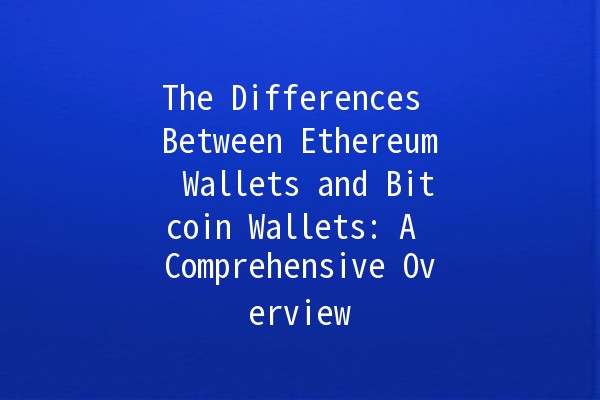
In the rapidly evolving world of cryptocurrencies, understanding the different types of wallets is essential for anyone looking to invest or engage with digital assets. Among the most popular cryptocurrencies are Bitcoin and Ethereum, both of which have unique wallets tailored to their respective ecosystems. This article will delve into the distinctions between Ethereum wallets and Bitcoin wallets, exploring their functionalities, security features, and overall user experience.
Understanding Cryptocurrency Wallets
A cryptocurrency wallet is a digital tool that allows users to store and manage their digital assets. These wallets don't actually store the cryptocurrencies themselves; rather, they store the public and private keys that allow users to interact with the blockchain.
Types of Wallets
Both Bitcoin and Ethereum wallets come in these varieties, but the specific architecture and use cases for them can vary.
Key Differences Between Ethereum Wallets and Bitcoin Wallets

Bitcoin Wallets: Primarily designed to hold Bitcoin (BTC) only. Users cannot store other cryptocurrencies in a Bitcoin wallet.
Ethereum Wallets: Can store not only Ether (ETH) but also various tokens created via Ethereum's ERC20 standards, as well as NFTs (nonfungible tokens) that reside on the Ethereum blockchain.
Bitcoin Wallets: Bitcoin has limited programmability and primarily focuses on peertopeer transactions. Thus, Bitcoin wallets do not support smart contracts.
Ethereum Wallets: Ethereum wallets are equipped with smart contract functionality, allowing users to interact with decentralized applications (dApps). They can also facilitate complex transactions automatically via these contract protocols.
Bitcoin: Transactions can often take longer to confirm due to network congestion. Bitcoin typically has lower transaction speeds when compared to Ethereum during high demand periods.
Ethereum: Generally faster transaction confirmation times. However, Ethereum transaction fees fluctuate based on network congestion but can be higher during peak times due to the more complicated processes involved in executing smart contracts.
Bitcoin Wallet Interfaces: Tend to be simpler and more straightforward. The focus is primarily on sending and receiving Bitcoin.
Ethereum Wallet Interfaces: Usually offer richer user interfaces due to the integration with dApps. Users can see their token balances, browse decentralized exchanges, and interact with smart contracts directly through the wallet interfaces.
Bitcoin Wallets: Commonly offer standard security features like twofactor authentication (2FA) and hardware wallet options for cold storage.
Ethereum Wallets: Although they share similar security features with Bitcoin wallets, Ethereum wallets also include mechanisms for additional protection against smart contract vulnerabilities and phishing attempts.
5 Productivity Tips for Maximizing Your Wallet Experience
To enhance security, utilize hardware wallets like Ledger or Trezor. These devices store your private keys offline, making them immune to online threats. Regularly back up your wallet data to ensure you can restore your assets in case of loss.
Ensure that your wallet software is consistently updated to benefit from the latest security measures. Most wallet providers roll out updates periodically to fix vulnerabilities and improve functionality.
Different wallets may offer varying insights into transaction fees. Before executing a transaction, especially during peak hours for Ethereum, check fee estimates to avoid overpaying. You can also use fee estimation tools available in most wallets.
Consider using multiple wallets for different purposes. For instance, use a hot wallet for daily transactions and a cold wallet for longterm storage. This strategy minimizes the risk of losing your entire asset base to a single point of failure.
If you’re using an Ethereum wallet, familiarize yourself with how smart contracts operate. Understanding where to find reliable dApps and being cautious about the contracts you interact with can greatly enhance your experience and security.
Frequently Asked Questions
No, Bitcoin and Ethereum require separate wallets due to their different protocols and underlying technologies. Some wallets accommodate multiple cryptocurrencies (multicurrency wallets), but they will still separate holdings by the type of cryptocurrency.
The safest method is to use a hardware wallet for longterm holdings. For shortterm usage, a reputable hot wallet may suffice, but always enable twofactor authentication (2FA) and ensure your software is updated.
Bitcoin transactions can take longer, often ranging from 10 minutes to several hours, depending on network congestion. Ethereum transactions are typically confirmed in seconds to minutes, but this can increase during high usage periods due to network congestion.
A smart contract is a selfexecuting contract with the terms of the agreement directly written into code. They run on the Ethereum blockchain, allowing transactions and agreements to be carried out automatically when conditions are met.
Many Ethereum wallets come with intuitive interfaces designed for ease of use, making them accessible even for beginners. More complex features like dApps and smart contracts may require additional learning, but basic operations are typically straightforward.
If you lose access to your wallet, the recovery depends on the type of wallet you use. Hardware wallets usually have recovery phrases that enable you to restore your assets. For other types of wallets, look for recovery options provided by the wallet service.
By understanding the fundamental differences between Ethereum and Bitcoin wallets, users can select the appropriate wallet that suits their needs. With the right knowledge and approach, managing your cryptocurrencies can be both rewarding and secure. Whether you are looking to invest, use decentralized applications, or merely store your assets, having the right wallet can significantly enhance your overall experience in the cryptocurrency space.

